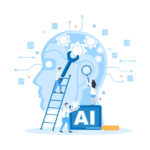 Automating Customer Service with AI transforms help desks. Explore innovative strategies that enhance efficiency while maintaining a high level of customer care.
Automating Customer Service with AI transforms help desks. Explore innovative strategies that enhance efficiency while maintaining a high level of customer care.
As the demand for efficient and effective customer service solutions continues to grow, businesses are turning to AI technology to provide automated assistance to their customers. AI-powered chatbots and virtual assistants offer the ability to handle repetitive tasks, answer FAQs, and escalate complex issues while providing real-time support.
The use of AI in customer support has several benefits, including enhanced efficiency, scalability, and improved customer satisfaction. By automating routine tasks, businesses can maximize their resources and provide faster response times to their customers. Additionally, AI-powered solutions can analyze customer data to identify patterns and personalize interactions.
The Advantages of AI in Customer Support
The implementation of AI in customer support has revolutionized the way businesses interact with their customers. AI support solutions offer benefits such as enhanced efficiency, scalability, and improved customer satisfaction. The use of AI in customer service efficiency can have a positive impact on a businesses’ bottom line.
One major advantage of using AI in customer support is its ability to handle large volumes of customer inquiries. Chatbots have become popular solutions to automate basic customer interactions, such as answering frequently asked questions. By using AI chatbots for customer service, businesses can free up human agents to handle more complex and high-priority customer inquiries, improving overall customer service efficiency.
AI support solutions can also analyze vast amounts of customer data to identify trends and patterns. This helps businesses understand their customers better and provide personalized experiences. By anticipating customer needs through predictive analytics, businesses can proactively provide support with faster response times, further enhancing customer satisfaction.
Additionally, AI in customer service efficiency can be cost-effective for businesses as it can reduce operational costs. The ability to automate routine customer interactions allows businesses to cut labor costs and reduce the need for additional staff. This not only reduces costs for the business but also improves customer experience by providing faster and more accurate responses.
Overall, AI-powered customer service solutions provide a myriad of benefits for businesses, including enhanced efficiency, scalability, and improved customer satisfaction. Incorporating AI in customer support is quickly becoming essential to remain competitive in today’s technology-driven market.
AI-Powered Chatbots for Customer Service
AI-powered chatbots are transforming the customer service industry by automating customer interactions and providing real-time support. These chatbots use natural language processing (NLP) and machine learning algorithms to understand and respond to customer queries.
They can handle repetitive tasks, answer frequently asked questions (FAQs), and escalate complex issues to human agents. AI chatbots for customer service have become increasingly popular due to their ability to enhance efficiency, scalability, and improve customer satisfaction.
| Benefits of AI Chatbots for Customer Support: |
|---|
| 24/7 Availability: Unlike human agents, AI chatbots can provide customer support anytime, anywhere, and on any device. |
| Faster Response Times: With AI chatbots, customers can receive real-time support and avoid long wait times. |
| Cost-effective: Chatbots save businesses money by reducing agent workload and increasing efficiency. |
| Improved Customer Satisfaction: AI chatbots can provide personalized interactions and resolve customer issues quickly, leading to higher satisfaction rates. |
AI-powered chatbots can also gather customer data, analyze patterns, and provide businesses with valuable insights to improve their customer service. They can offer personalized recommendations and proactive support to enhance the user experience.
Implementing AI-Powered Chatbots
Implementing AI-powered chatbots requires a thoughtful approach. First, businesses must define their objectives and identify areas where chatbots can have the most significant impact. They need to ensure integration with existing systems and provide relevant training to the team.
Designing chatbots require experts’ knowledge, focusing on user-centric mindsets, developing conversational flows, integrating with NLP engines, testing, and continuous improvements. Companies can hire AI developers to build chatbots from scratch or use chatbot-building platforms like DialogFlow or IBM Watson.
AI-powered chatbots are the future of customer service, and their popularity continues to grow. Businesses can leverage their potential to enhance customer experience and improve their bottom line.
Implementing Customer Service Automation
Integrating AI technology into customer service operations can enhance efficiency, reduce response times, and improve customer satisfaction. However, successful implementation requires careful planning and execution. Here are some key considerations for implementing customer service automation:
- Develop a strategy: Start by identifying areas of the customer service process that could benefit from automation. Prioritize tasks that are time-consuming or repetitive and consider the impact on customer experience.
- Choose the right technology: Evaluate different AI solutions to find one that suits your needs. Consider factors such as accuracy, scalability, and integration with existing systems.
- Train your staff: Ensure that your team is prepared to work with AI technology. Provide training on how to use the system and how to handle exceptions or errors.
- Integrate with existing systems: Ensure that the AI solution can seamlessly integrate with your existing systems, such as CRM or ticketing systems.
Implementing customer service automation can lead to significant benefits for businesses, including improved efficiency, reduced costs, and increased customer satisfaction. To ensure success, it is important to develop a clear strategy, choose the right technology, train your staff, and integrate with existing systems.
Improving User Experience with AI
One of the key benefits of implementing AI in customer support is the potential to enhance user experience. By leveraging AI technology, businesses can personalize customer interactions and provide faster, more proactive support. This can lead to increased user satisfaction and loyalty.
Here are some ways that AI can improve user experience:
- Personalized Recommendations: AI algorithms can analyze customer data and behavior to provide personalized product or service recommendations. This can help businesses anticipate customer needs and offer tailored solutions.
- Proactive Support: With AI-powered chatbots, businesses can provide 24/7 support and detect issues before they escalate. By addressing customer concerns in real-time, businesses can improve overall satisfaction and reduce churn.
- Faster Response Times: AI chatbots can handle repetitive tasks and answer common questions instantly, freeing up human agents to focus on more complex issues. This can lead to faster response times and improved customer satisfaction.
By improving user experience with AI, businesses can differentiate themselves from competitors and build long-term customer relationships. As AI technology continues to evolve, the potential for enhancing user satisfaction will only grow.
AI and Natural Language Processing
One of the key advantages of AI in customer assistance is its ability to understand and respond to natural language queries. This is made possible through Natural Language Processing (NLP), a subfield of AI that focuses on the interactions between humans and computers using natural language.
NLP enables AI-powered chatbots to communicate with customers in a more human-like manner, making the interaction feel more natural and intuitive. By understanding the context and intent behind a customer’s query, chatbots can provide more accurate and appropriate responses, reducing the need for human intervention.
NLP also enables AI systems to analyze and interpret unstructured data, such as customer feedback and reviews, allowing businesses to gain deeper insights into customer preferences and pain points. This information can be used to improve products and services, enhance personalization, and drive business growth.
As AI technology continues to advance, so will NLP, enabling even more sophisticated customer assistance systems that can understand and respond to increasingly complex queries and requests.
Leveraging Data Analytics for AI Customer Service
One of the most significant advantages of AI-powered customer service is the ability to use data analytics to provide more efficient and effective support. By analyzing customer interactions and behaviors, AI algorithms can identify patterns and trends, enabling businesses to improve service quality and personalize interactions.
With AI, companies can collect vast amounts of customer data, including chat transcripts, call recordings, and social media interactions. This data can be analyzed to detect patterns, such as common customer complaints or frequently asked questions, allowing for proactive resolution of issues and more personalized support.
| Benefits of Data Analytics in AI Customer Service |
|---|
| Improved Efficiency |
| Personalized Interactions |
| In-Depth Customer Insights |
With AI, businesses can also gain valuable insights into customer preferences and behaviors, allowing for more targeted marketing campaigns and product development. Additionally, data analytics can improve the efficiency of customer service operations, as AI can quickly route inquiries to the right channels and provide automated responses to simple inquiries.
However, it is important to ensure that data is used ethically and transparently, as customer trust is paramount in maintaining long-term relationships. Companies must be transparent about their use of customer data and ensure that it is collected and analyzed securely and lawfully.
Overall, leveraging data analytics in AI customer service can improve efficiency, enhance customer satisfaction and personalization, and provide valuable insights into customer behaviors and preferences.
Steps to Developing AI Customer Service Solutions
Building effective AI customer service solutions requires careful planning and implementation. Here are the steps to follow:
- Data collection: Gather customer interaction data from various sources, such as call logs, chats, and social media.
- Model training: Train the AI model using machine learning algorithms and the collected data. Fine-tune the model by incorporating customer feedback.
- Testing: Test the AI model in a controlled environment to identify and fix any issues. Use sample customer data to gauge its performance.
- Integration: Integrate the AI model with existing customer service systems such as CRM and ticketing software.
- Deployment: Deploy the AI system to production and monitor its performance. Make iterative improvements based on customer feedback and data analysis.
It’s essential to hire experienced AI developers who understand the nuances of developing AI-powered customer service solutions. At Hire AI Developer, our team of experts has extensive experience in creating and implementing effective AI systems for businesses across various industries.
Working with Hire AI Developer
When you partner with Hire AI Developer, we’ll work collaboratively with you to create a custom AI solution tailored to your unique business needs. Our developers will handle every aspect of the process, from data collection to deployment, ensuring a seamless integration with your existing systems.
At Hire AI Developer, we prioritize transparency and customer satisfaction. We’ll provide regular updates on the development progress and seek your feedback at every stage of the process. Our goal is to deliver high-quality, cost-effective AI solutions that help your business thrive.
Ethical Considerations in AI Customer Service
As businesses increasingly turn to AI for customer service automation, it is crucial to address the ethical considerations associated with the use of this technology. AI-powered systems must be designed to ensure customer privacy, prevent bias and discrimination, and maintain transparency to build trust.
One important ethical consideration in AI customer service is data privacy. Companies must ensure that the data collected from customers is stored and used appropriately, and that customers have control over their personal information. Transparency is also crucial in making customers aware of how their data is being used.
Another significant ethical consideration is bias. AI systems must be designed to mitigate the risk of bias and discrimination. This can be achieved by using diverse data sets to train the algorithms and regularly assessing them for potential biases.
Finally, transparency is a key component in building customer trust and ensuring ethical AI. Customers should be informed when they are interacting with an AI-powered system and made aware of how the system works.
By addressing these ethical considerations, businesses can ensure that their AI customer service solutions are efficient, effective, and ethical. Deploying ethical AI will not only enhance customer trust and loyalty but also safeguard the reputation and credibility of the business.
AI Customer Service Success Stories
Many businesses have already implemented AI-powered customer service solutions, achieving remarkable results. Here are some success stories:
1. Bank of America
Bank of America uses Erica, a virtual financial assistant powered by AI, to help customers manage their finances. Erica can assist with tasks such as transferring funds, paying bills, and analyzing spending habits. Since its launch in 2018, Erica has helped Bank of America save millions of dollars in customer service costs and improve their overall customer experience.
2. KLM Royal Dutch Airlines
KLM Royal Dutch Airlines uses an AI-powered chatbot to provide real-time customer support to travelers. The chatbot is capable of handling a wide range of questions and issues, including flight delays, cancellations, and booking changes. Since its implementation, the chatbot has reduced customer wait times by 50% and increased customer satisfaction ratings.
3. H&M
H&M uses an AI-powered virtual stylist to provide personalized outfit recommendations to customers. The virtual stylist, called “Ask Anna,” analyzes customer preferences and offers suggestions based on style, occasion, and weather. Since its launch, Ask Anna has increased customer engagement and improved sales for H&M.
4. Vodafone
Vodafone uses an AI-powered chatbot to handle customer inquiries and resolve issues. The chatbot, called TOBi, can assist with tasks such as billing, account management, and technical support. Since its implementation, TOBi has reduced customer wait times by 30% and increased customer satisfaction ratings.
These examples demonstrate the potential benefits of incorporating AI into customer service. By automating routine tasks and providing personalized support, businesses can reduce costs, improve efficiency, and enhance customer satisfaction.
Final Thoughts
Ihe implementation of AI in customer service automation has emerged as a game-changer for businesses looking to enhance efficiency and improve customer satisfaction. AI-powered chatbots and natural language processing technologies have revolutionized the way customers interact with businesses, providing personalized recommendations, proactive support, and faster response times.
The integration of data analytics and AI algorithms enables businesses to analyze customer data, identify patterns, and improve service quality.
However, it is important to consider ethical considerations associated with AI customer service, such as data privacy, bias, and transparency. To create ethical AI systems and ensure customer trust, businesses must design and implement AI systems with great care.
About Hire AI Developer
Hire AI Developer is a leading provider of AI-enabled solutions, with a team of experienced developers and data scientists dedicated to delivering high-quality services. We specialize in developing custom AI solutions for businesses of all sizes, leveraging cutting-edge technologies to enhance efficiency and improve user satisfaction.
Our team has expertise in various AI technologies such as machine learning, natural language processing, and computer vision. We have successfully implemented AI solutions in various industries, including healthcare, finance, and e-commerce, among others.
Hire AI Developer is committed to delivering exceptional results for our clients, ensuring that our solutions meet their unique business needs and objectives. We provide end-to-end support, from ideation to deployment, to ensure the success of our projects.
Trust Hire AI Developer to deliver top-notch AI solutions and transform the way your business operates. Contact us today to learn more about our services and how we can help you leverage AI to automate your customer service operations.
External Resources
https://en.wikipedia.org/wiki/Artificial_intelligence
https://www.ibm.com/topics/artificial-intelligence
FAQ
FAQ 1: How can I start automating customer service in my business using AI?
Answer: Automating customer service with AI begins by integrating chatbots into your customer interaction points, such as websites or social media platforms. Chatbots can handle common queries, freeing up human agents for more complex issues. Here’s a basic example using Python and the Flask framework to set up a simple AI chatbot:
from flask import Flask, request, jsonify
from transformers import pipeline
app = Flask(__name__)
# Load a pre-trained model for conversation
chatbot = pipeline("conversational")
@app.route('/chat', methods=['POST'])
def chat():
user_message = request.json.get('message')
response = chatbot(user_message)
return jsonify({"response": response[0]['generated_text']})
if __name__ == '__main__':
app.run(debug=True)This code sets up a web service that responds to chat messages with AI-generated text, using a conversational model from Hugging Face’s Transformers library.
FAQ 2: Can AI handle complex customer service inquiries?
Answer: While AI is excellent for managing routine inquiries, its ability to handle complex issues depends on the training and sophistication of the model. Advanced AI systems can interpret nuanced queries but might still struggle with highly specific or technical issues. Implementing a fallback to human agents for complex questions is a best practice. Here’s how you might set up a basic check in Python to escalate complex queries:
def handle_query(query):
if "complex" in query.lower():
return "Let me connect you with a human agent."
else:
# Assume chatbot_response is a function that processes AI responses
return chatbot_response(query)
query = "I have a complex issue with my account."
print(handle_query(query))This snippet demonstrates a simple method to detect and escalate complex inquiries to human agents.
FAQ 3: How can I ensure the AI system continuously improves its customer service responses?
Answer: Continuous improvement in AI-driven customer service is achieved through regular training and feedback loops. Incorporating customer feedback and monitoring chatbot interactions help identify areas for enhancement. You can implement logging for AI interactions and periodically retrain your model with new data. Here’s a conceptual code snippet for logging chatbot interactions:
def log_interaction(user_query, chatbot_response):
# This function logs the conversation for analysis
with open("chat_logs.txt", "a") as log_file:
log_file.write(f"User: {user_query}\nChatbot: {chatbot_response}\n\n")
user_query = "How do I reset my password?"
response = chatbot_response(user_query) # Assume this function generates a response
log_interaction(user_query, response)This example logs conversations to a file, which can later be analyzed to identify areas for retraining the AI model, ensuring the system evolves and improves over time.
Benjamin Bale is a distinguished expert in the field of AI development and an esteemed author for the “Hire AI Developer” blog. With a remarkable decade-long experience in the industry, Benjamin has cemented his reputation as a leading authority in AI app and website development, as well as AI backend integrations. His profound passion for AI and its transformative potential is evident in every aspect of his work.
Benjamin’s journey into the world of AI began at Edinburgh University, where he pursued his studies in AI and Mathematics. It was during this time that he cultivated a deep understanding and fascination for the subject. Throughout his career, Benjamin has accumulated extensive experience working with industry giants such as Goldman Sachs, Tencent, and Ali Express. These invaluable experiences have not only sharpened his skills in integrating existing systems with AI APIs but have also solidified his status as a consummate professional in the field.
Currently residing in the vibrant city of London, Benjamin finds solace in his role as both an author and developer. Beyond his professional endeavors, he takes great joy in the company of his faithful canine companion, Chad, and indulges his passion for snowboarding in the picturesque mountains of France. Benjamin’s unwavering dedication to advancing AI technology, combined with his wealth of knowledge and practical expertise, make him an invaluable asset to the “Hire AI Developer” team and an invaluable resource for readers seeking profound insights into the realm of AI.






